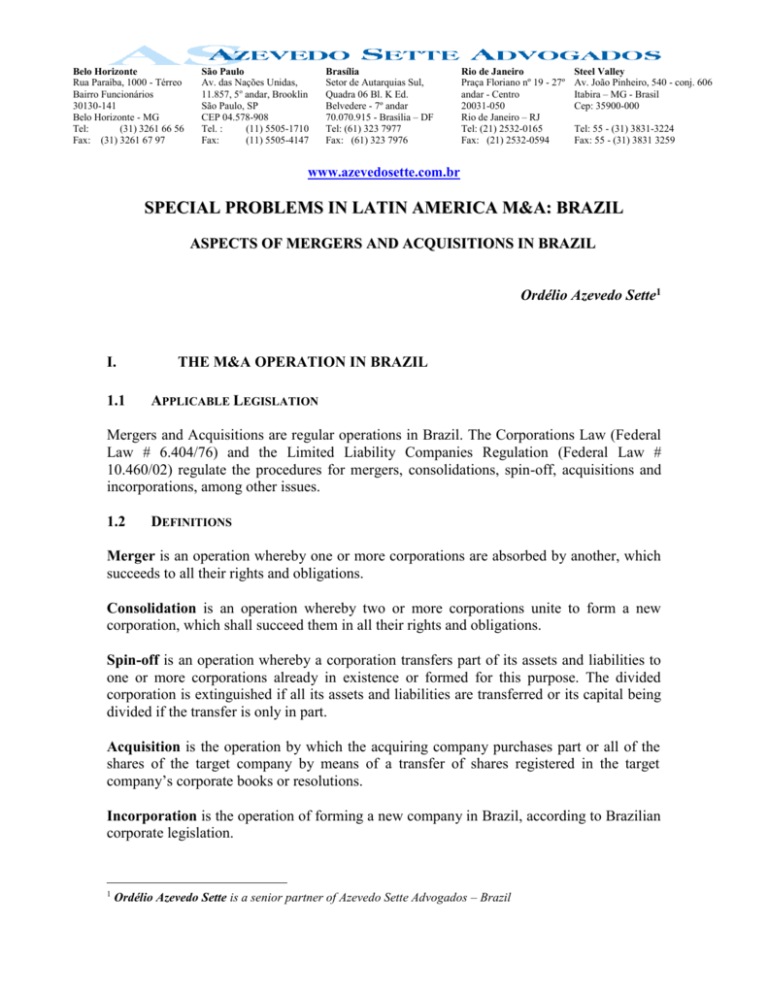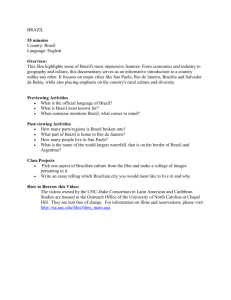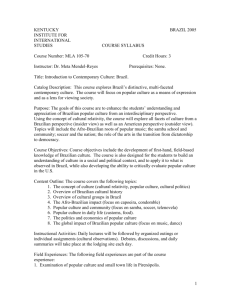M&A in Brazil - American Bar Association
advertisement

Belo Horizonte Rua Paraíba, 1000 - Térreo Bairro Funcionários 30130-141 Belo Horizonte - MG Tel: (31) 3261 66 56 Fax: (31) 3261 67 97 São Paulo Av. das Nações Unidas, 11.857, 5o andar, Brooklin São Paulo, SP CEP 04.578-908 Tel. : (11) 5505-1710 Fax: (11) 5505-4147 Brasília Setor de Autarquias Sul, Quadra 06 Bl. K Ed. Belvedere - 7º andar 70.070.915 - Brasília – DF Tel: (61) 323 7977 Fax: (61) 323 7976 Rio de Janeiro Praça Floriano nº 19 - 27º andar - Centro 20031-050 Rio de Janeiro – RJ Tel: (21) 2532-0165 Fax: (21) 2532-0594 Steel Valley Av. João Pinheiro, 540 - conj. 606 Itabira – MG - Brasil Cep: 35900-000 Tel: 55 - (31) 3831-3224 Fax: 55 - (31) 3831 3259 www.azevedosette.com.br SPECIAL PROBLEMS IN LATIN AMERICA M&A: BRAZIL ASPECTS OF MERGERS AND ACQUISITIONS IN BRAZIL Ordélio Azevedo Sette1 I. 1.1 THE M&A OPERATION IN BRAZIL APPLICABLE LEGISLATION Mergers and Acquisitions are regular operations in Brazil. The Corporations Law (Federal Law # 6.404/76) and the Limited Liability Companies Regulation (Federal Law # 10.460/02) regulate the procedures for mergers, consolidations, spin-off, acquisitions and incorporations, among other issues. 1.2 DEFINITIONS Merger is an operation whereby one or more corporations are absorbed by another, which succeeds to all their rights and obligations. Consolidation is an operation whereby two or more corporations unite to form a new corporation, which shall succeed them in all their rights and obligations. Spin-off is an operation whereby a corporation transfers part of its assets and liabilities to one or more corporations already in existence or formed for this purpose. The divided corporation is extinguished if all its assets and liabilities are transferred or its capital being divided if the transfer is only in part. Acquisition is the operation by which the acquiring company purchases part or all of the shares of the target company by means of a transfer of shares registered in the target company’s corporate books or resolutions. Incorporation is the operation of forming a new company in Brazil, according to Brazilian corporate legislation. 1 Ordélio Azevedo Sette is a senior partner of Azevedo Sette Advogados – Brazil II. PREVIOUS STEPS TO CLOSE AN M&A OPERATION IN BRAZIL 2.1 DUE DILIGENCE AND CONTRACTS When participating in or undergoing through a M&A operation in Brazil, it is highly recommendable that a company seeks legal and auditing assistance to arrange for due diligence of the acquired or target company and drafting and negotiation of the letter of intentions and applicable contracts, in addition to observing several legal requirements. Assessing the liabilities of the target company may severely affect the purchasing price in the transaction. Especially tax, labor and environmental legislations in Brazil are very complex and burdensome and lawsuits involving such matters in Brazil may produce a severe impact in the decision making process. Brazilian companies are more than 80% family-owned and managed by their owners. In larger companies there are professional executives. Mainly in the South and Southeast region (States of Sao Paulo, Rio de Janeiro, Minas Gerais, Paraná, and Rio Grande do Sul). Negotiations in Brazil never follow a standard pattern and normally vary on a case-by-case basis. In small and medium-sized companies, owners conduct negotiations, while many larger companies have people trained for that purpose. In significant business negotiations the chief executive officer or chairperson of the board of directors may become involved assisting the company's negotiations team in solving significant issues. Lawyers usually assist in the operation. Contracts in Brazil are on a less formal basis than the extensive, signed agreements used in the United States. 2.2 INCORPORATING IN BRAZIL M&A operations often require that the acquiring party incorporate a new company to use in the operation due to commercial or tax planning reasons. For this matter, Brazilian law sets forth that for the incorporation in Brazil, considering the existence of a foreign shareholder, the first step is the registration of such shareholder before the National Tax Payer Register, whether it is an individual or a legal entity. Foreign companies or individual foreign shareholders of Brazilian companies must maintain a representative (attorney-in-fact) in Brazil with powers to receive service of process not only regarding Brazilian Courts, but also to represent before Brazilian Tax Authorities. The foreign company shall be required to present a Certificate of Incorporation of its country of origin or passport and a power of attorney. Note that any and all foreign documents to be valid in Brazil must be legalized by a Brazilian Consulate abroad and translated in Brazil by a sworn translator. Therefore, the incorporation of a company in Brazil necessarily involves at least five phases: (i) the registration of the foreign shareholder before the Federal Tax Payer, (ii) the registration of the company's Articles of Association or By-laws before the State Board of Trade or Public Notary, (iii) the enrolment and registration of the company before the Federal Tax Payer Register, (iv) the enrolment and registration of the company before the local municipality, and (v) the enrolment and registration of the company before the State Tax Payer Register (only for commercial companies). Further registrations before other public agencies may also be required according to the company’s purposes and activities. The most common types of corporate forms that companies are organized under are: Limited Liability Company (Sociedade Limitada) and Joint Stock Corporation (Sociedade Anônima) Main requirements applicable to both types of companies: (i) (ii) (iii) (iv) (v) (vi) (vii) 2.3 shareholders (in principle, both of them can be non residents, provided that a Brazilian resident representative is appointed); there is no minimum capital (except for bank, insurance and others); officers must be Brazilian residents; directors may be non Brazilian residents; mandatory annual shareholders´ meeting; mandatory publication of some of its corporate acts; mandatory bookkeeping. MERGERS, CONSOLIDATIONS AND SPIN-OFF OPERATIONS Mergers, consolidations and spin-off operations in Brazil shall be submitted to a general meeting of the interested corporations, with a statement of reasons, which shall include: I. II. III. IV. the economic, financial or social reasons for or the objectives of the operation, and the interest of the corporation in effecting it; the shares which the shareholders shall receive and, if any changes in their rights are provided, the reasons therefore; the equity structure after the operation, according to types and classes of shares, and the capital of the corporations issuing shares in substitution for those to be extinguished; the refund value of the shares to which dissenting shareholders shall be entitled. The conditions of the mergers, consolidations and spin-off operations shall be set forth in a protocol, which shall be executed by the administrative bodies or partners of the interested corporations and which shall indicate: I. the number, type and class of new shares that shall be given in substitution for the old shares and the criteria used to determine the relations between such substituted shares; II. III. IV. V. VI. VII. in the event of a division, the assets and liabilities which shall form the assets and liabilities of each part; the criteria for valuing the net value, the date at which the evaluation shall be made and the effect of subsequent variations in the assets and liabilities; how shares or quotas of one corporation owned by another will be dealt with; the amount of the capital of any corporation being created or of the increase or decrease in the capital of the corporations participating in the operation; a draft of the bylaws or amendments which shall be approved in order to effect the operation; all further conditions to which the operation may be subject. Mergers, consolidations and spin-off operations may only be carried out under the approved conditions if appointed expert valuers determine that the total net value to be transferred to form capital is at least equal to the amount of capital to be paid up. 2.4 PURCHASE AND SALE OF ASSETS The acquiring company may also purchase only the assets of a specific plant or company in Brazil. The agreement for the purchase and sale of assets shall be registered with the local Board of Trade and published in the official gazette. Unless otherwise agreed in writing by the parties, the former owner of the assets sold may not compete with the acquiring company for a period of 5 years following the sale. The acquiring company shall be liable for the accounted debts prior to the transfer and shall succeed in all rights and obligations, including contracts involving such assets, provided that the former owner shall remain liable for 1 year after the sale. 2.5 FOREIGN CAPITAL REGISTRATION The foreign acquiring company may also directly purchase shares of the target company in Brazil, without having to incorporate a new company in Brazil. For this matter, foreign capital shall be registered before the Central Bank of Brazil within 30 days of the execution of the exchange contract, subject to penalties and fines imposed by the Central Bank that may reach the amount of R$250,000 (two hundred and fifty thousand reais). Prior from sending any money transfer as investments or loans to a Brazilian company, the foreign Company must proceed with the previous registration before the Central Bank in order to have access to the Central Bank’s system – SISBACEN. Brazil maintains a liberal posture towards foreign investment, with low restrictions to investments in most industries. Thus, most activities may be freely executed by companies belonging to foreign citizens or entities. Exceptions are expressly determined by Law, such as coastal shipping, domestic airlines, broadcasting, press, atomic energy production, ownership of lands, etc. There is no difference in treatment of foreign companies, from a legal standpoint, in all matters relating to tax, labor rights, social security, or civil and commercial law. A company incorporated in Brazil is Brazilian regardless of the nationality of its shareholders. Distribution and remittance of dividends (including to non-Brazilian shareholders) are not subject to taxation. 2.6 LIABILITIES As a general rule, the acquiring company shall always succeed the acquired target company in all its rights, obligations and responsibilities. In case of spin-off operations, in principle, the corporation absorbing a portion of the assets and liabilities of the divided corporation shall succeed to all unlisted assets and hidden liabilities and be jointly liable for all rights and obligation of the divided company prior to the spin-off. The instrument of spin-off may provide that the corporations absorbing portions of the assets and liabilities of the divided corporation shall be liable only for those debts which are transferred to them, without joint liability subsisting between themselves or with the divided corporation; in the latter case, however, any existing creditor may oppose the provision with regard to his debt, provided he notifies the corporation within 90 (ninety) days from the date of publication of the instruments of division. With regards to merger or consolidation operations, within 60 (sixty) days after the publication of the instruments relating to the merger or consolidation, any existing creditor aggrieved by it may bring proceedings to annul the operation. A creditor who fails to exercise this right during such a period shall forfeit such right. III. ANTITRUST AND COMPETITION LAW As the case may be the merger or acquisition operation shall have to be subject to the Brazilian Competition and Antitrust Agency that seeks to secure free and fair competition, following the existing constitutional principles. This requirement will only be needed when the operation involves more than 400 million reais (about US$135 million) or more 20% of the market share of its respective products. IV. GOVERNING LAW AND JURISDICTION – A REAL ISSUE Furthermore, it is important to emphasize that the jurisdiction and governing law for business transactions in Brazil are regulated by the Introductory Law to the Civil Code, the Civil Code and the Code of Civil Procedure, all of which are federal laws and applicable throughout the country. The parties may elect the applicable law and jurisdiction. If the parties do not establish it, according to the introductory law to the Civil Code, for contracts executed in Brazil the applicable law is Brazilian law and for contracts made abroad the applicable law is the law of the jurisdiction where the agreement was executed. But the Code of Civil Procedure contains provisions setting forth Brazilian court jurisdiction on international matters when the defendant, of whatever nationality, resides in Brazil; when the accomplishment of the obligation would take place in Brazil; or when the dispute relates to facts that occurred or to acts committed in Brazil. It is also common to encounter international contracts made in Brazil, in which at least one of the parties is a foreigner residing abroad, that contain provisions saying that the parties thereto consent to have the laws of another jurisdiction governing the agreement. It is also common for parties in some international agreements to consent to the jurisdiction of the courts of one or more jurisdictions. Although there are precedents in some Brazilian courts restricting these provisions, they are generally considered enforceable and acceptable according to the Brazilian law. V. DISPUTE RESOLUTION MECHANISMS The courts are the most used contractual dispute resolution mechanism in Brazil. Arbitration is recently introduced in Brazil and it is not an usual proceeding. However, the judiciary system is extremely lengthy and bureaucratic and new arbitration entities are being created and more accepted gradually. There are state and federal courts whose jurisdictions are regulated by the federal Constitution and applicable laws. A dispute resolution is presented to a federal or a state court, depending on the matter involved in the dispute or the parties thereto. The parties in an agreement cannot consent to the jurisdiction of a federal or state court different from that required by the applicable law and the Constitution. In general, the parties can only make a choice of territorial jurisdiction in Brazil, but they are never allowed to choose a federal court, for example, instead of a state court. The Code of Civil Procedure is a federal law, used in both federal and state courts, and provides complete regulation covering the entire procedure. Arbitration in Brazil as already mentionedis not an usual mechanism to resolve contractual disputes, the country is signatory of the Panama Convention of 1975, is in process of signature of the New York Convention but is not signatory of the UNCITRAL. Brazilian Federal Law 9.307/96 also regulates arbitration. With regard foreign arbitration award the Arbitration Law includes a specific provision that sets forth the recognition and enforceability of foreign arbitration award, and this provision has been frequently applied by the Supreme Court as mentioned in the following paragraph. The Federal Constitution in Brazil, through an exequatur system, grants enforcement to any foreign judgment or foreign arbitration award that has been examined and confirmed by the Supreme Court of Brazil. October 14, 2004 Ordélio Azevedo Sette







